Psychology Report: Theories and Factors in Health and Social Care
VerifiedAdded on 2019/12/04
|12
|4338
|389
Report
AI Summary
This report delves into the application of psychological theories within the context of health and social care. It begins by comparing various theories of life span development, highlighting key stages and associated psychological conflicts. The report then explores the social and biological factors influencing human behaviour, using a case study to illustrate these concepts. The importance of social roles within health and social care settings is examined, emphasizing their impact on patient well-being. Further, the report applies psychological theories to individual cases, discussing behaviour disturbances and the understanding of mental disorders. Finally, it analyzes psychological principles affecting behaviour change and relationships within the health and social care environment. The report concludes with a summary of the key findings and insights.
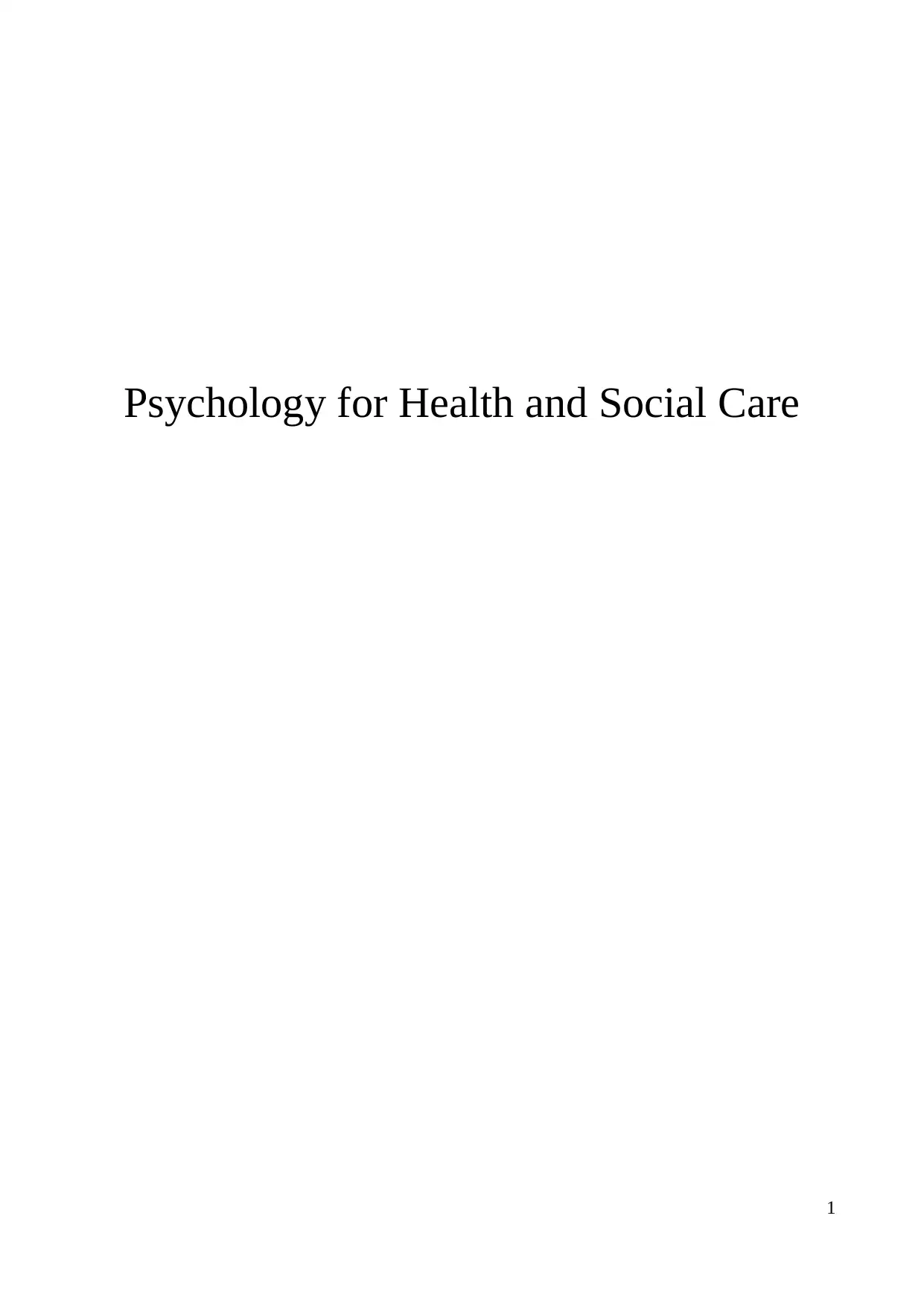
Psychology for Health and Social Care
1
1
Paraphrase This Document
Need a fresh take? Get an instant paraphrase of this document with our AI Paraphraser
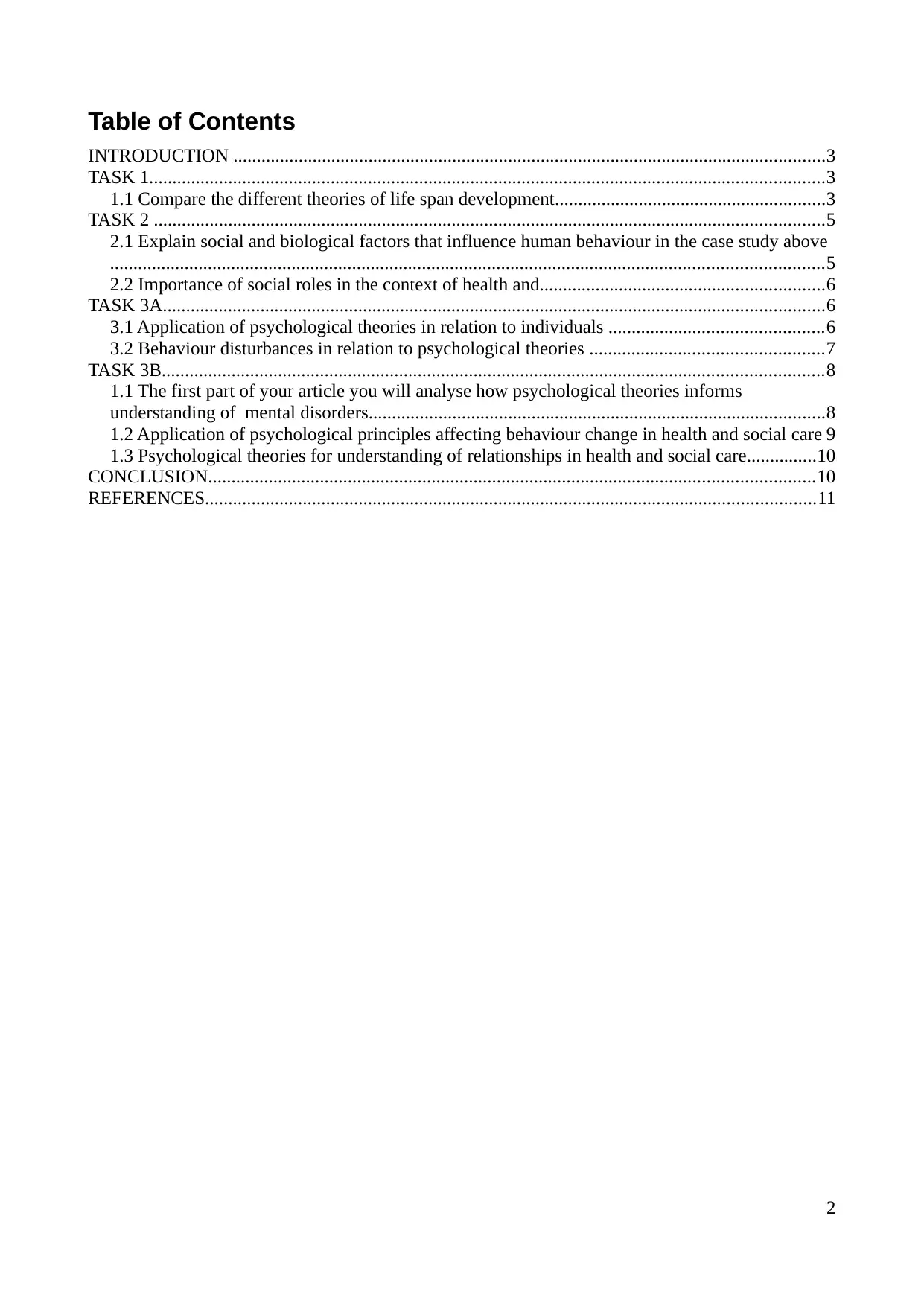
Table of Contents
INTRODUCTION ...............................................................................................................................3
TASK 1.................................................................................................................................................3
1.1 Compare the different theories of life span development..........................................................3
TASK 2 ................................................................................................................................................5
2.1 Explain social and biological factors that influence human behaviour in the case study above
.........................................................................................................................................................5
2.2 Importance of social roles in the context of health and.............................................................6
TASK 3A..............................................................................................................................................6
3.1 Application of psychological theories in relation to individuals ..............................................6
3.2 Behaviour disturbances in relation to psychological theories ..................................................7
TASK 3B..............................................................................................................................................8
1.1 The first part of your article you will analyse how psychological theories informs
understanding of mental disorders..................................................................................................8
1.2 Application of psychological principles affecting behaviour change in health and social care 9
1.3 Psychological theories for understanding of relationships in health and social care...............10
CONCLUSION..................................................................................................................................10
REFERENCES...................................................................................................................................11
2
INTRODUCTION ...............................................................................................................................3
TASK 1.................................................................................................................................................3
1.1 Compare the different theories of life span development..........................................................3
TASK 2 ................................................................................................................................................5
2.1 Explain social and biological factors that influence human behaviour in the case study above
.........................................................................................................................................................5
2.2 Importance of social roles in the context of health and.............................................................6
TASK 3A..............................................................................................................................................6
3.1 Application of psychological theories in relation to individuals ..............................................6
3.2 Behaviour disturbances in relation to psychological theories ..................................................7
TASK 3B..............................................................................................................................................8
1.1 The first part of your article you will analyse how psychological theories informs
understanding of mental disorders..................................................................................................8
1.2 Application of psychological principles affecting behaviour change in health and social care 9
1.3 Psychological theories for understanding of relationships in health and social care...............10
CONCLUSION..................................................................................................................................10
REFERENCES...................................................................................................................................11
2
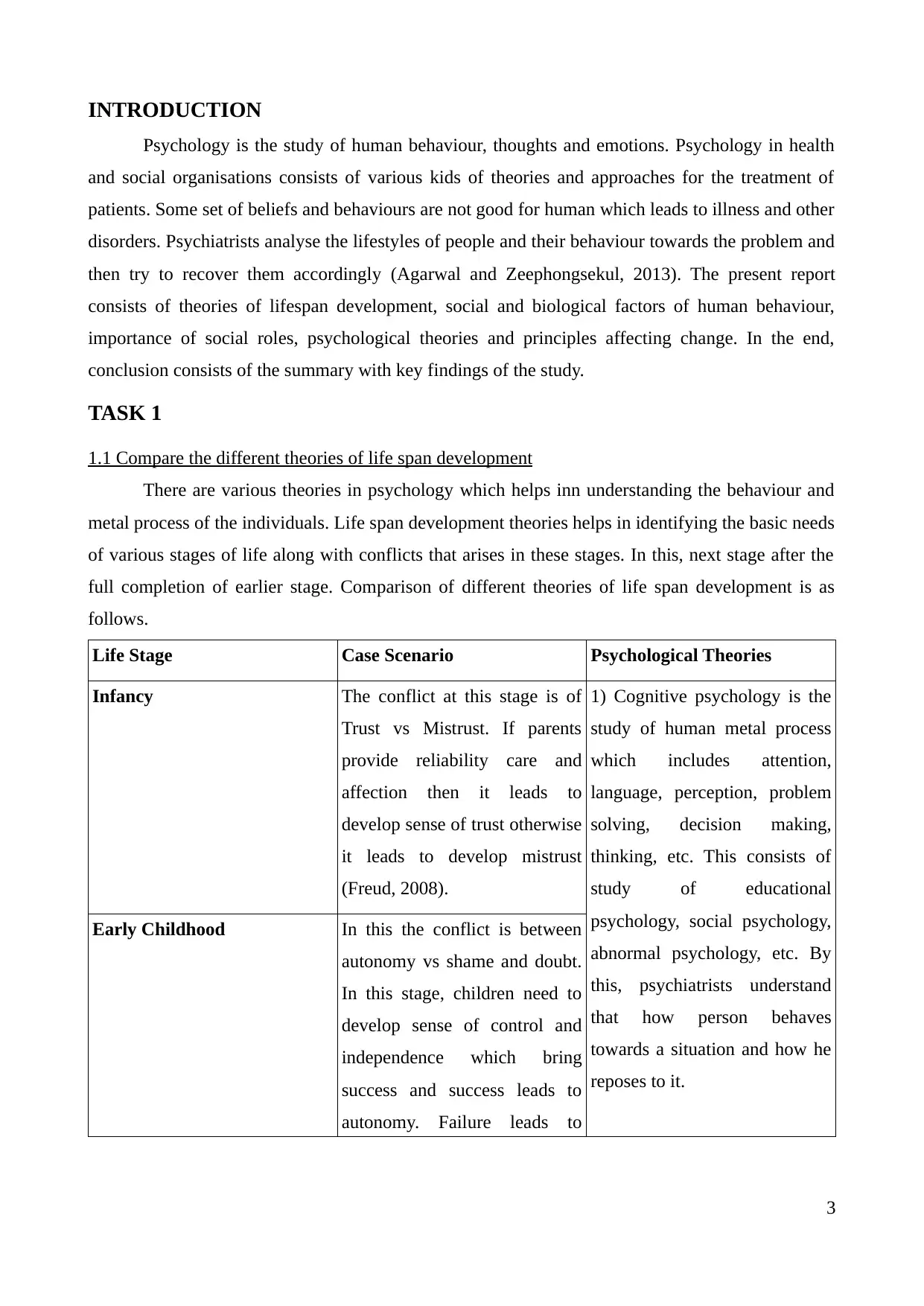
INTRODUCTION
Psychology is the study of human behaviour, thoughts and emotions. Psychology in health
and social organisations consists of various kids of theories and approaches for the treatment of
patients. Some set of beliefs and behaviours are not good for human which leads to illness and other
disorders. Psychiatrists analyse the lifestyles of people and their behaviour towards the problem and
then try to recover them accordingly (Agarwal and Zeephongsekul, 2013). The present report
consists of theories of lifespan development, social and biological factors of human behaviour,
importance of social roles, psychological theories and principles affecting change. In the end,
conclusion consists of the summary with key findings of the study.
TASK 1
1.1 Compare the different theories of life span development
There are various theories in psychology which helps inn understanding the behaviour and
metal process of the individuals. Life span development theories helps in identifying the basic needs
of various stages of life along with conflicts that arises in these stages. In this, next stage after the
full completion of earlier stage. Comparison of different theories of life span development is as
follows.
Life Stage Case Scenario Psychological Theories
Infancy The conflict at this stage is of
Trust vs Mistrust. If parents
provide reliability care and
affection then it leads to
develop sense of trust otherwise
it leads to develop mistrust
(Freud, 2008).
1) Cognitive psychology is the
study of human metal process
which includes attention,
language, perception, problem
solving, decision making,
thinking, etc. This consists of
study of educational
psychology, social psychology,
abnormal psychology, etc. By
this, psychiatrists understand
that how person behaves
towards a situation and how he
reposes to it.
Early Childhood In this the conflict is between
autonomy vs shame and doubt.
In this stage, children need to
develop sense of control and
independence which bring
success and success leads to
autonomy. Failure leads to
3
Psychology is the study of human behaviour, thoughts and emotions. Psychology in health
and social organisations consists of various kids of theories and approaches for the treatment of
patients. Some set of beliefs and behaviours are not good for human which leads to illness and other
disorders. Psychiatrists analyse the lifestyles of people and their behaviour towards the problem and
then try to recover them accordingly (Agarwal and Zeephongsekul, 2013). The present report
consists of theories of lifespan development, social and biological factors of human behaviour,
importance of social roles, psychological theories and principles affecting change. In the end,
conclusion consists of the summary with key findings of the study.
TASK 1
1.1 Compare the different theories of life span development
There are various theories in psychology which helps inn understanding the behaviour and
metal process of the individuals. Life span development theories helps in identifying the basic needs
of various stages of life along with conflicts that arises in these stages. In this, next stage after the
full completion of earlier stage. Comparison of different theories of life span development is as
follows.
Life Stage Case Scenario Psychological Theories
Infancy The conflict at this stage is of
Trust vs Mistrust. If parents
provide reliability care and
affection then it leads to
develop sense of trust otherwise
it leads to develop mistrust
(Freud, 2008).
1) Cognitive psychology is the
study of human metal process
which includes attention,
language, perception, problem
solving, decision making,
thinking, etc. This consists of
study of educational
psychology, social psychology,
abnormal psychology, etc. By
this, psychiatrists understand
that how person behaves
towards a situation and how he
reposes to it.
Early Childhood In this the conflict is between
autonomy vs shame and doubt.
In this stage, children need to
develop sense of control and
independence which bring
success and success leads to
autonomy. Failure leads to
3
⊘ This is a preview!⊘
Do you want full access?
Subscribe today to unlock all pages.

Trusted by 1+ million students worldwide
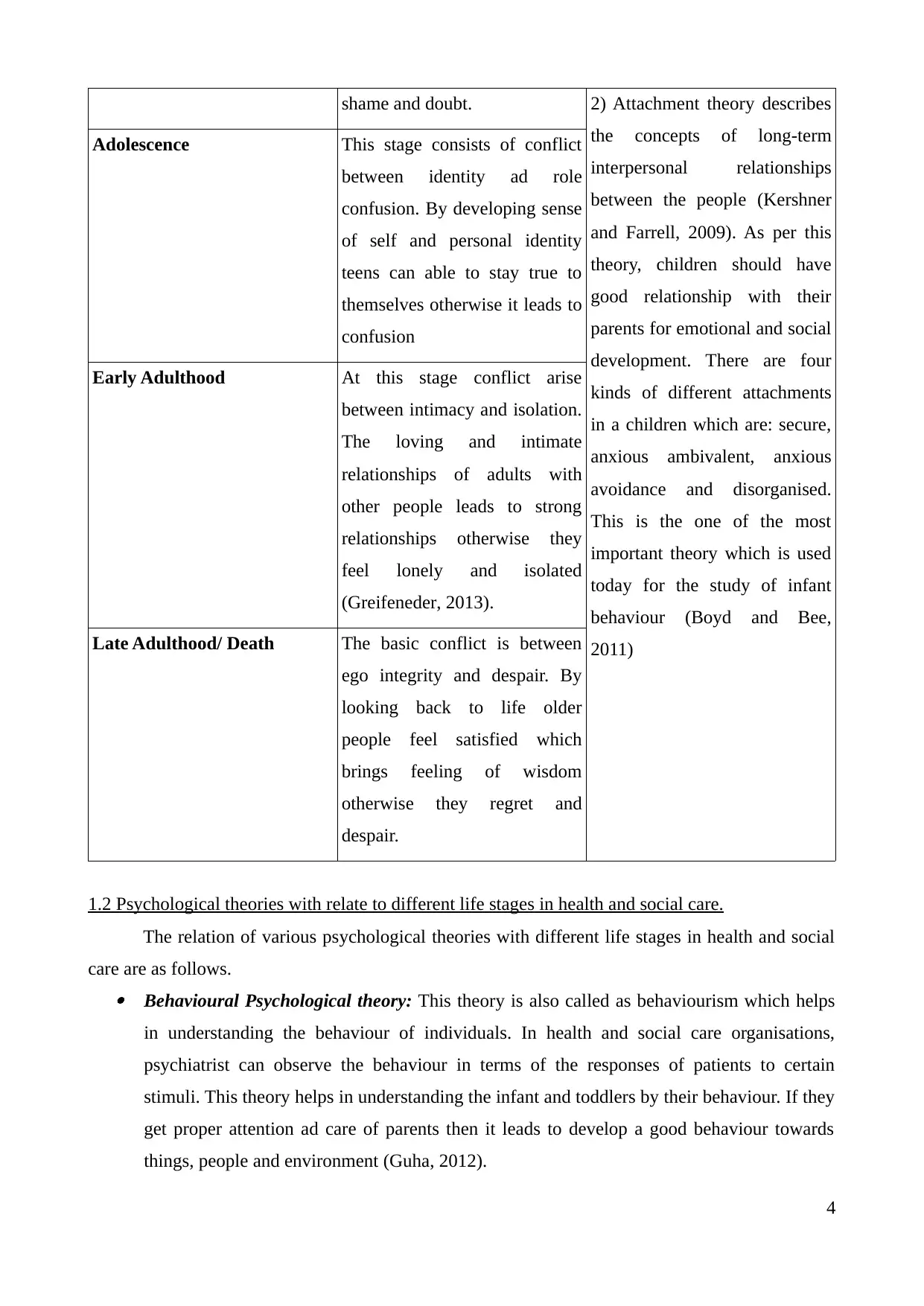
shame and doubt. 2) Attachment theory describes
the concepts of long-term
interpersonal relationships
between the people (Kershner
and Farrell, 2009). As per this
theory, children should have
good relationship with their
parents for emotional and social
development. There are four
kinds of different attachments
in a children which are: secure,
anxious ambivalent, anxious
avoidance and disorganised.
This is the one of the most
important theory which is used
today for the study of infant
behaviour (Boyd and Bee,
2011)
Adolescence This stage consists of conflict
between identity ad role
confusion. By developing sense
of self and personal identity
teens can able to stay true to
themselves otherwise it leads to
confusion
Early Adulthood At this stage conflict arise
between intimacy and isolation.
The loving and intimate
relationships of adults with
other people leads to strong
relationships otherwise they
feel lonely and isolated
(Greifeneder, 2013).
Late Adulthood/ Death The basic conflict is between
ego integrity and despair. By
looking back to life older
people feel satisfied which
brings feeling of wisdom
otherwise they regret and
despair.
1.2 Psychological theories with relate to different life stages in health and social care.
The relation of various psychological theories with different life stages in health and social
care are as follows. Behavioural Psychological theory: This theory is also called as behaviourism which helps
in understanding the behaviour of individuals. In health and social care organisations,
psychiatrist can observe the behaviour in terms of the responses of patients to certain
stimuli. This theory helps in understanding the infant and toddlers by their behaviour. If they
get proper attention ad care of parents then it leads to develop a good behaviour towards
things, people and environment (Guha, 2012).
4
the concepts of long-term
interpersonal relationships
between the people (Kershner
and Farrell, 2009). As per this
theory, children should have
good relationship with their
parents for emotional and social
development. There are four
kinds of different attachments
in a children which are: secure,
anxious ambivalent, anxious
avoidance and disorganised.
This is the one of the most
important theory which is used
today for the study of infant
behaviour (Boyd and Bee,
2011)
Adolescence This stage consists of conflict
between identity ad role
confusion. By developing sense
of self and personal identity
teens can able to stay true to
themselves otherwise it leads to
confusion
Early Adulthood At this stage conflict arise
between intimacy and isolation.
The loving and intimate
relationships of adults with
other people leads to strong
relationships otherwise they
feel lonely and isolated
(Greifeneder, 2013).
Late Adulthood/ Death The basic conflict is between
ego integrity and despair. By
looking back to life older
people feel satisfied which
brings feeling of wisdom
otherwise they regret and
despair.
1.2 Psychological theories with relate to different life stages in health and social care.
The relation of various psychological theories with different life stages in health and social
care are as follows. Behavioural Psychological theory: This theory is also called as behaviourism which helps
in understanding the behaviour of individuals. In health and social care organisations,
psychiatrist can observe the behaviour in terms of the responses of patients to certain
stimuli. This theory helps in understanding the infant and toddlers by their behaviour. If they
get proper attention ad care of parents then it leads to develop a good behaviour towards
things, people and environment (Guha, 2012).
4
Paraphrase This Document
Need a fresh take? Get an instant paraphrase of this document with our AI Paraphraser
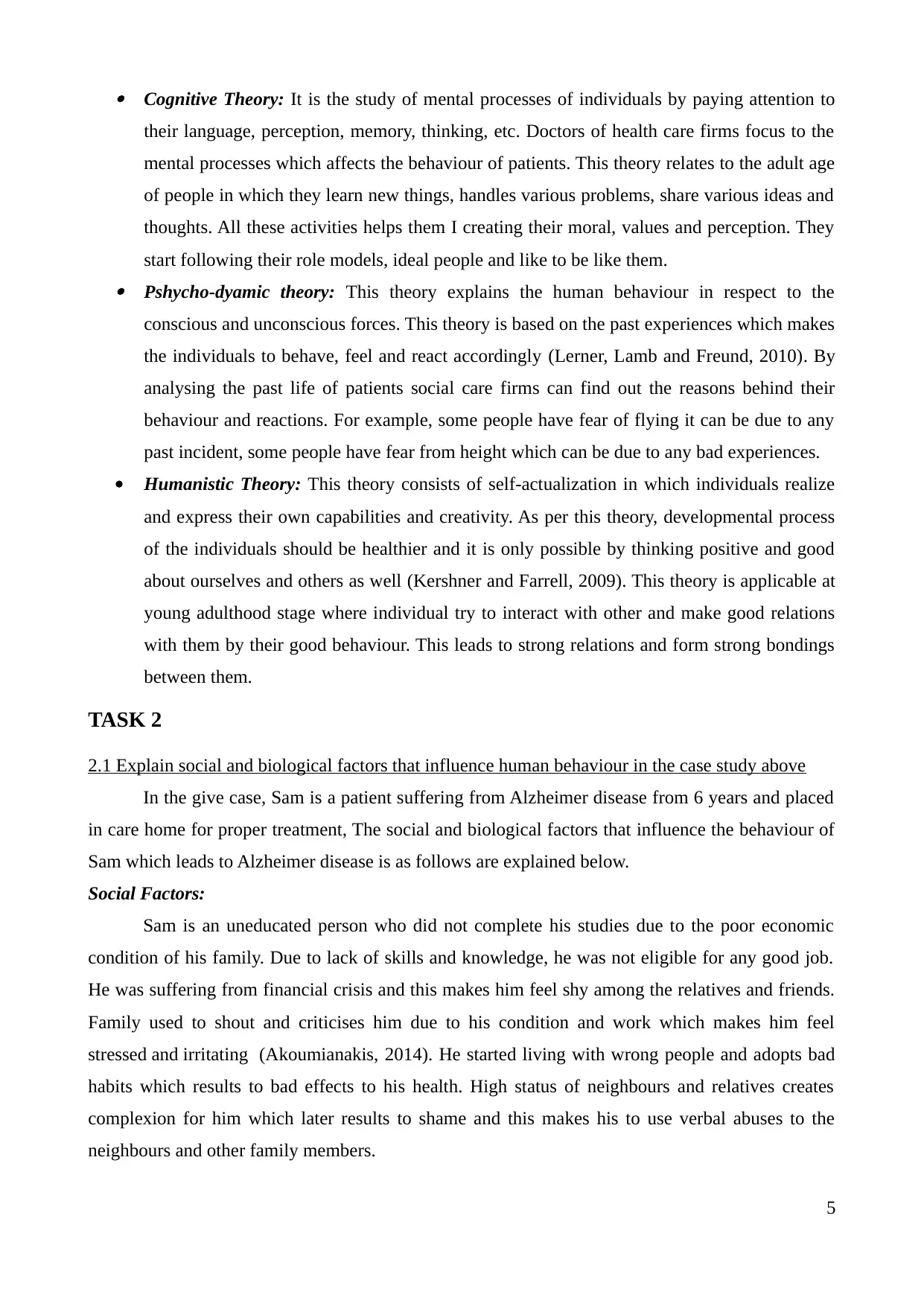
Cognitive Theory: It is the study of mental processes of individuals by paying attention to
their language, perception, memory, thinking, etc. Doctors of health care firms focus to the
mental processes which affects the behaviour of patients. This theory relates to the adult age
of people in which they learn new things, handles various problems, share various ideas and
thoughts. All these activities helps them I creating their moral, values and perception. They
start following their role models, ideal people and like to be like them. Pshycho-dyamic theory: This theory explains the human behaviour in respect to the
conscious and unconscious forces. This theory is based on the past experiences which makes
the individuals to behave, feel and react accordingly (Lerner, Lamb and Freund, 2010). By
analysing the past life of patients social care firms can find out the reasons behind their
behaviour and reactions. For example, some people have fear of flying it can be due to any
past incident, some people have fear from height which can be due to any bad experiences.
Humanistic Theory: This theory consists of self-actualization in which individuals realize
and express their own capabilities and creativity. As per this theory, developmental process
of the individuals should be healthier and it is only possible by thinking positive and good
about ourselves and others as well (Kershner and Farrell, 2009). This theory is applicable at
young adulthood stage where individual try to interact with other and make good relations
with them by their good behaviour. This leads to strong relations and form strong bondings
between them.
TASK 2
2.1 Explain social and biological factors that influence human behaviour in the case study above
In the give case, Sam is a patient suffering from Alzheimer disease from 6 years and placed
in care home for proper treatment, The social and biological factors that influence the behaviour of
Sam which leads to Alzheimer disease is as follows are explained below.
Social Factors:
Sam is an uneducated person who did not complete his studies due to the poor economic
condition of his family. Due to lack of skills and knowledge, he was not eligible for any good job.
He was suffering from financial crisis and this makes him feel shy among the relatives and friends.
Family used to shout and criticises him due to his condition and work which makes him feel
stressed and irritating (Akoumianakis, 2014). He started living with wrong people and adopts bad
habits which results to bad effects to his health. High status of neighbours and relatives creates
complexion for him which later results to shame and this makes his to use verbal abuses to the
neighbours and other family members.
5
their language, perception, memory, thinking, etc. Doctors of health care firms focus to the
mental processes which affects the behaviour of patients. This theory relates to the adult age
of people in which they learn new things, handles various problems, share various ideas and
thoughts. All these activities helps them I creating their moral, values and perception. They
start following their role models, ideal people and like to be like them. Pshycho-dyamic theory: This theory explains the human behaviour in respect to the
conscious and unconscious forces. This theory is based on the past experiences which makes
the individuals to behave, feel and react accordingly (Lerner, Lamb and Freund, 2010). By
analysing the past life of patients social care firms can find out the reasons behind their
behaviour and reactions. For example, some people have fear of flying it can be due to any
past incident, some people have fear from height which can be due to any bad experiences.
Humanistic Theory: This theory consists of self-actualization in which individuals realize
and express their own capabilities and creativity. As per this theory, developmental process
of the individuals should be healthier and it is only possible by thinking positive and good
about ourselves and others as well (Kershner and Farrell, 2009). This theory is applicable at
young adulthood stage where individual try to interact with other and make good relations
with them by their good behaviour. This leads to strong relations and form strong bondings
between them.
TASK 2
2.1 Explain social and biological factors that influence human behaviour in the case study above
In the give case, Sam is a patient suffering from Alzheimer disease from 6 years and placed
in care home for proper treatment, The social and biological factors that influence the behaviour of
Sam which leads to Alzheimer disease is as follows are explained below.
Social Factors:
Sam is an uneducated person who did not complete his studies due to the poor economic
condition of his family. Due to lack of skills and knowledge, he was not eligible for any good job.
He was suffering from financial crisis and this makes him feel shy among the relatives and friends.
Family used to shout and criticises him due to his condition and work which makes him feel
stressed and irritating (Akoumianakis, 2014). He started living with wrong people and adopts bad
habits which results to bad effects to his health. High status of neighbours and relatives creates
complexion for him which later results to shame and this makes his to use verbal abuses to the
neighbours and other family members.
5
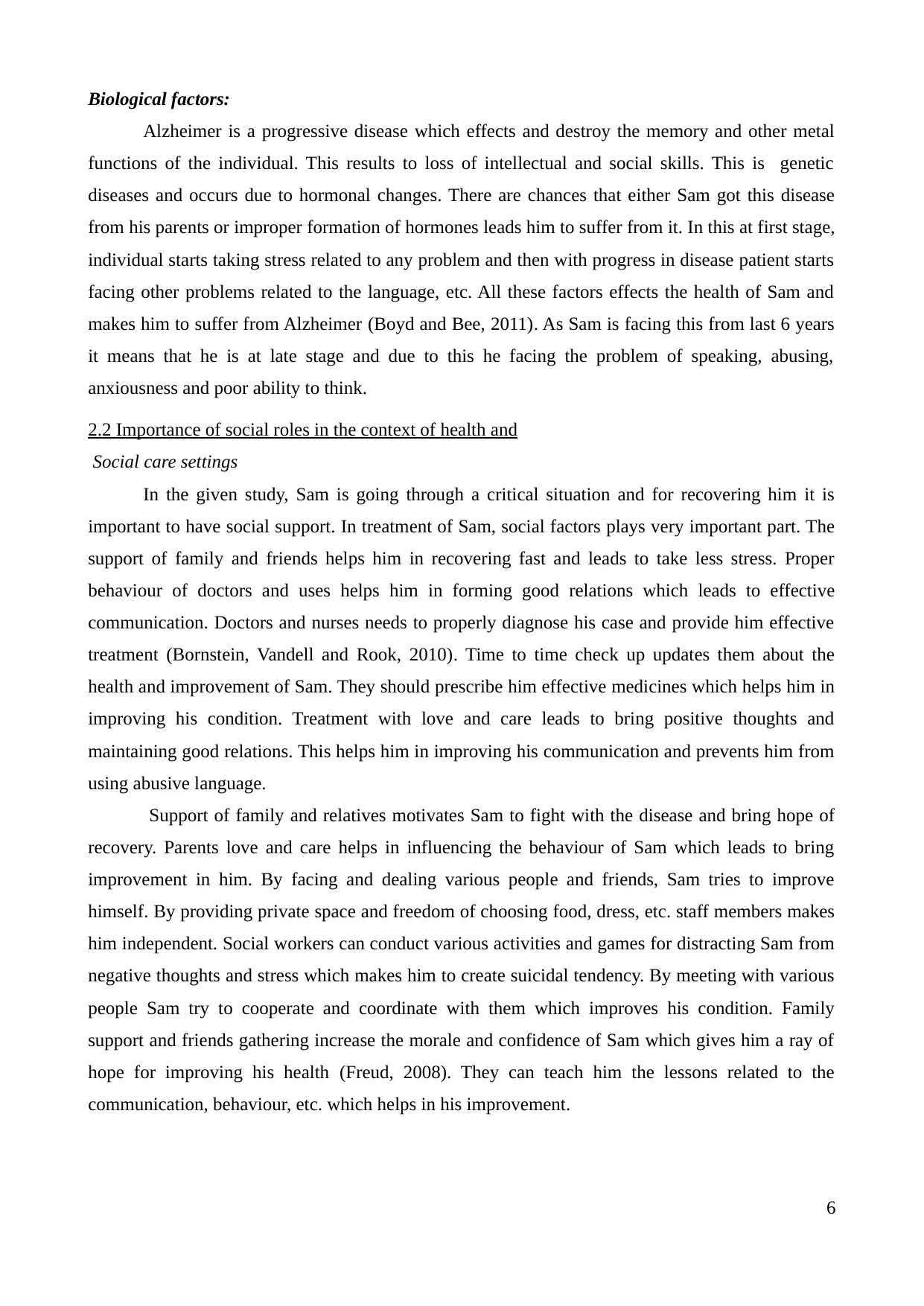
Biological factors:
Alzheimer is a progressive disease which effects and destroy the memory and other metal
functions of the individual. This results to loss of intellectual and social skills. This is genetic
diseases and occurs due to hormonal changes. There are chances that either Sam got this disease
from his parents or improper formation of hormones leads him to suffer from it. In this at first stage,
individual starts taking stress related to any problem and then with progress in disease patient starts
facing other problems related to the language, etc. All these factors effects the health of Sam and
makes him to suffer from Alzheimer (Boyd and Bee, 2011). As Sam is facing this from last 6 years
it means that he is at late stage and due to this he facing the problem of speaking, abusing,
anxiousness and poor ability to think.
2.2 Importance of social roles in the context of health and
Social care settings
In the given study, Sam is going through a critical situation and for recovering him it is
important to have social support. In treatment of Sam, social factors plays very important part. The
support of family and friends helps him in recovering fast and leads to take less stress. Proper
behaviour of doctors and uses helps him in forming good relations which leads to effective
communication. Doctors and nurses needs to properly diagnose his case and provide him effective
treatment (Bornstein, Vandell and Rook, 2010). Time to time check up updates them about the
health and improvement of Sam. They should prescribe him effective medicines which helps him in
improving his condition. Treatment with love and care leads to bring positive thoughts and
maintaining good relations. This helps him in improving his communication and prevents him from
using abusive language.
Support of family and relatives motivates Sam to fight with the disease and bring hope of
recovery. Parents love and care helps in influencing the behaviour of Sam which leads to bring
improvement in him. By facing and dealing various people and friends, Sam tries to improve
himself. By providing private space and freedom of choosing food, dress, etc. staff members makes
him independent. Social workers can conduct various activities and games for distracting Sam from
negative thoughts and stress which makes him to create suicidal tendency. By meeting with various
people Sam try to cooperate and coordinate with them which improves his condition. Family
support and friends gathering increase the morale and confidence of Sam which gives him a ray of
hope for improving his health (Freud, 2008). They can teach him the lessons related to the
communication, behaviour, etc. which helps in his improvement.
6
Alzheimer is a progressive disease which effects and destroy the memory and other metal
functions of the individual. This results to loss of intellectual and social skills. This is genetic
diseases and occurs due to hormonal changes. There are chances that either Sam got this disease
from his parents or improper formation of hormones leads him to suffer from it. In this at first stage,
individual starts taking stress related to any problem and then with progress in disease patient starts
facing other problems related to the language, etc. All these factors effects the health of Sam and
makes him to suffer from Alzheimer (Boyd and Bee, 2011). As Sam is facing this from last 6 years
it means that he is at late stage and due to this he facing the problem of speaking, abusing,
anxiousness and poor ability to think.
2.2 Importance of social roles in the context of health and
Social care settings
In the given study, Sam is going through a critical situation and for recovering him it is
important to have social support. In treatment of Sam, social factors plays very important part. The
support of family and friends helps him in recovering fast and leads to take less stress. Proper
behaviour of doctors and uses helps him in forming good relations which leads to effective
communication. Doctors and nurses needs to properly diagnose his case and provide him effective
treatment (Bornstein, Vandell and Rook, 2010). Time to time check up updates them about the
health and improvement of Sam. They should prescribe him effective medicines which helps him in
improving his condition. Treatment with love and care leads to bring positive thoughts and
maintaining good relations. This helps him in improving his communication and prevents him from
using abusive language.
Support of family and relatives motivates Sam to fight with the disease and bring hope of
recovery. Parents love and care helps in influencing the behaviour of Sam which leads to bring
improvement in him. By facing and dealing various people and friends, Sam tries to improve
himself. By providing private space and freedom of choosing food, dress, etc. staff members makes
him independent. Social workers can conduct various activities and games for distracting Sam from
negative thoughts and stress which makes him to create suicidal tendency. By meeting with various
people Sam try to cooperate and coordinate with them which improves his condition. Family
support and friends gathering increase the morale and confidence of Sam which gives him a ray of
hope for improving his health (Freud, 2008). They can teach him the lessons related to the
communication, behaviour, etc. which helps in his improvement.
6
⊘ This is a preview!⊘
Do you want full access?
Subscribe today to unlock all pages.

Trusted by 1+ million students worldwide
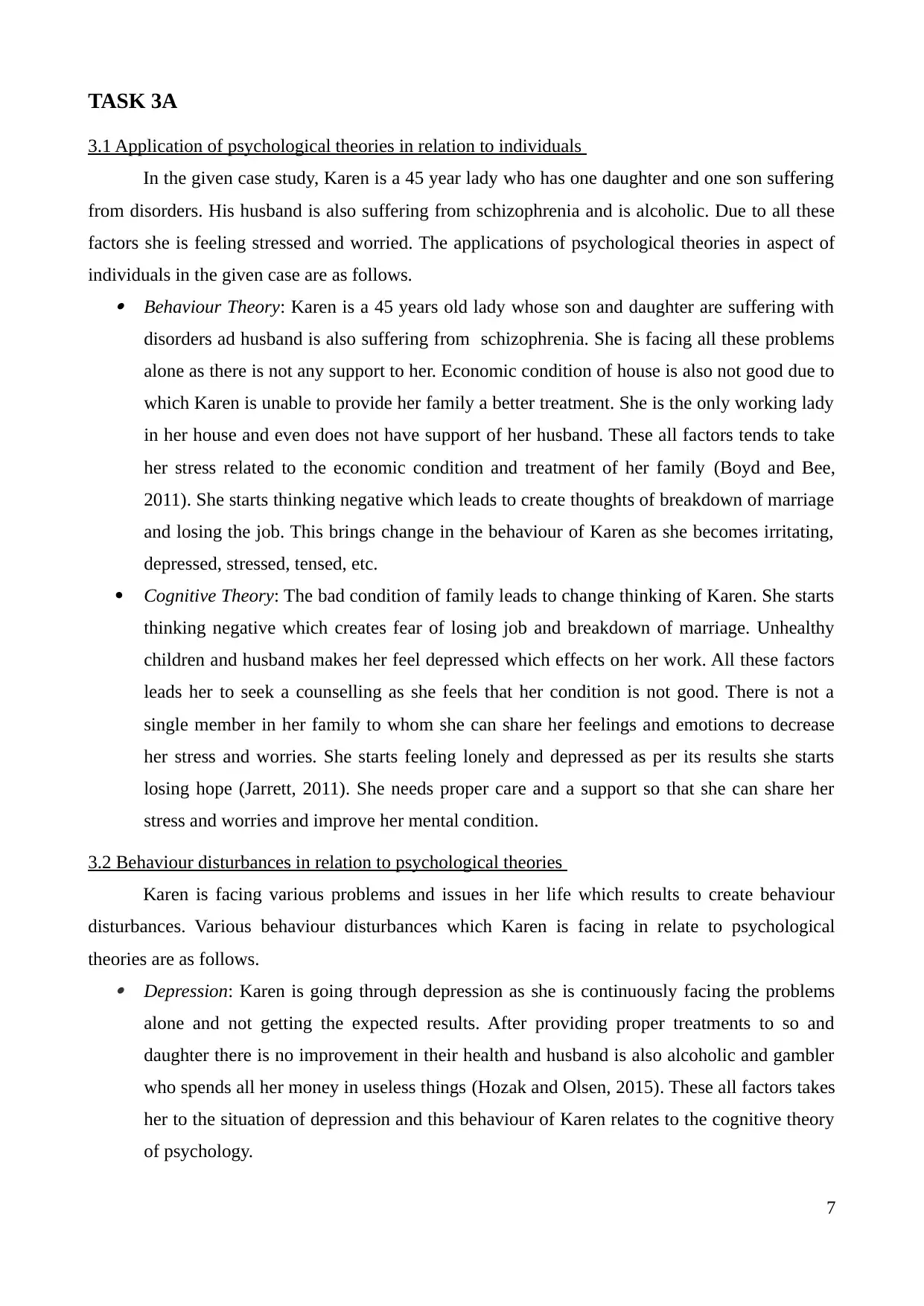
TASK 3A
3.1 Application of psychological theories in relation to individuals
In the given case study, Karen is a 45 year lady who has one daughter and one son suffering
from disorders. His husband is also suffering from schizophrenia and is alcoholic. Due to all these
factors she is feeling stressed and worried. The applications of psychological theories in aspect of
individuals in the given case are as follows. Behaviour Theory: Karen is a 45 years old lady whose son and daughter are suffering with
disorders ad husband is also suffering from schizophrenia. She is facing all these problems
alone as there is not any support to her. Economic condition of house is also not good due to
which Karen is unable to provide her family a better treatment. She is the only working lady
in her house and even does not have support of her husband. These all factors tends to take
her stress related to the economic condition and treatment of her family (Boyd and Bee,
2011). She starts thinking negative which leads to create thoughts of breakdown of marriage
and losing the job. This brings change in the behaviour of Karen as she becomes irritating,
depressed, stressed, tensed, etc.
Cognitive Theory: The bad condition of family leads to change thinking of Karen. She starts
thinking negative which creates fear of losing job and breakdown of marriage. Unhealthy
children and husband makes her feel depressed which effects on her work. All these factors
leads her to seek a counselling as she feels that her condition is not good. There is not a
single member in her family to whom she can share her feelings and emotions to decrease
her stress and worries. She starts feeling lonely and depressed as per its results she starts
losing hope (Jarrett, 2011). She needs proper care and a support so that she can share her
stress and worries and improve her mental condition.
3.2 Behaviour disturbances in relation to psychological theories
Karen is facing various problems and issues in her life which results to create behaviour
disturbances. Various behaviour disturbances which Karen is facing in relate to psychological
theories are as follows. Depression: Karen is going through depression as she is continuously facing the problems
alone and not getting the expected results. After providing proper treatments to so and
daughter there is no improvement in their health and husband is also alcoholic and gambler
who spends all her money in useless things (Hozak and Olsen, 2015). These all factors takes
her to the situation of depression and this behaviour of Karen relates to the cognitive theory
of psychology.
7
3.1 Application of psychological theories in relation to individuals
In the given case study, Karen is a 45 year lady who has one daughter and one son suffering
from disorders. His husband is also suffering from schizophrenia and is alcoholic. Due to all these
factors she is feeling stressed and worried. The applications of psychological theories in aspect of
individuals in the given case are as follows. Behaviour Theory: Karen is a 45 years old lady whose son and daughter are suffering with
disorders ad husband is also suffering from schizophrenia. She is facing all these problems
alone as there is not any support to her. Economic condition of house is also not good due to
which Karen is unable to provide her family a better treatment. She is the only working lady
in her house and even does not have support of her husband. These all factors tends to take
her stress related to the economic condition and treatment of her family (Boyd and Bee,
2011). She starts thinking negative which leads to create thoughts of breakdown of marriage
and losing the job. This brings change in the behaviour of Karen as she becomes irritating,
depressed, stressed, tensed, etc.
Cognitive Theory: The bad condition of family leads to change thinking of Karen. She starts
thinking negative which creates fear of losing job and breakdown of marriage. Unhealthy
children and husband makes her feel depressed which effects on her work. All these factors
leads her to seek a counselling as she feels that her condition is not good. There is not a
single member in her family to whom she can share her feelings and emotions to decrease
her stress and worries. She starts feeling lonely and depressed as per its results she starts
losing hope (Jarrett, 2011). She needs proper care and a support so that she can share her
stress and worries and improve her mental condition.
3.2 Behaviour disturbances in relation to psychological theories
Karen is facing various problems and issues in her life which results to create behaviour
disturbances. Various behaviour disturbances which Karen is facing in relate to psychological
theories are as follows. Depression: Karen is going through depression as she is continuously facing the problems
alone and not getting the expected results. After providing proper treatments to so and
daughter there is no improvement in their health and husband is also alcoholic and gambler
who spends all her money in useless things (Hozak and Olsen, 2015). These all factors takes
her to the situation of depression and this behaviour of Karen relates to the cognitive theory
of psychology.
7
Paraphrase This Document
Need a fresh take? Get an instant paraphrase of this document with our AI Paraphraser
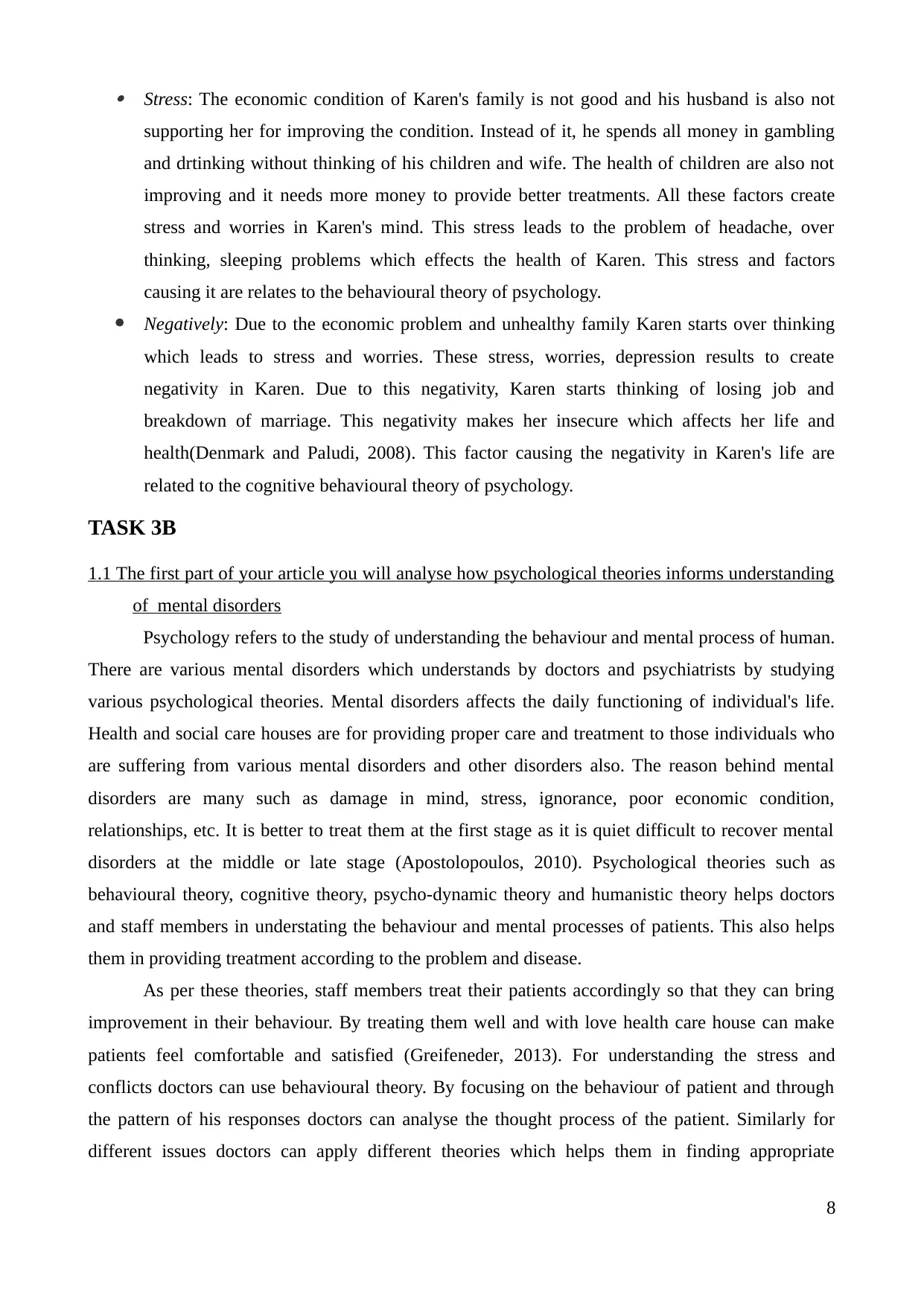
Stress: The economic condition of Karen's family is not good and his husband is also not
supporting her for improving the condition. Instead of it, he spends all money in gambling
and drtinking without thinking of his children and wife. The health of children are also not
improving and it needs more money to provide better treatments. All these factors create
stress and worries in Karen's mind. This stress leads to the problem of headache, over
thinking, sleeping problems which effects the health of Karen. This stress and factors
causing it are relates to the behavioural theory of psychology.
Negatively: Due to the economic problem and unhealthy family Karen starts over thinking
which leads to stress and worries. These stress, worries, depression results to create
negativity in Karen. Due to this negativity, Karen starts thinking of losing job and
breakdown of marriage. This negativity makes her insecure which affects her life and
health(Denmark and Paludi, 2008). This factor causing the negativity in Karen's life are
related to the cognitive behavioural theory of psychology.
TASK 3B
1.1 The first part of your article you will analyse how psychological theories informs understanding
of mental disorders
Psychology refers to the study of understanding the behaviour and mental process of human.
There are various mental disorders which understands by doctors and psychiatrists by studying
various psychological theories. Mental disorders affects the daily functioning of individual's life.
Health and social care houses are for providing proper care and treatment to those individuals who
are suffering from various mental disorders and other disorders also. The reason behind mental
disorders are many such as damage in mind, stress, ignorance, poor economic condition,
relationships, etc. It is better to treat them at the first stage as it is quiet difficult to recover mental
disorders at the middle or late stage (Apostolopoulos, 2010). Psychological theories such as
behavioural theory, cognitive theory, psycho-dynamic theory and humanistic theory helps doctors
and staff members in understating the behaviour and mental processes of patients. This also helps
them in providing treatment according to the problem and disease.
As per these theories, staff members treat their patients accordingly so that they can bring
improvement in their behaviour. By treating them well and with love health care house can make
patients feel comfortable and satisfied (Greifeneder, 2013). For understanding the stress and
conflicts doctors can use behavioural theory. By focusing on the behaviour of patient and through
the pattern of his responses doctors can analyse the thought process of the patient. Similarly for
different issues doctors can apply different theories which helps them in finding appropriate
8
supporting her for improving the condition. Instead of it, he spends all money in gambling
and drtinking without thinking of his children and wife. The health of children are also not
improving and it needs more money to provide better treatments. All these factors create
stress and worries in Karen's mind. This stress leads to the problem of headache, over
thinking, sleeping problems which effects the health of Karen. This stress and factors
causing it are relates to the behavioural theory of psychology.
Negatively: Due to the economic problem and unhealthy family Karen starts over thinking
which leads to stress and worries. These stress, worries, depression results to create
negativity in Karen. Due to this negativity, Karen starts thinking of losing job and
breakdown of marriage. This negativity makes her insecure which affects her life and
health(Denmark and Paludi, 2008). This factor causing the negativity in Karen's life are
related to the cognitive behavioural theory of psychology.
TASK 3B
1.1 The first part of your article you will analyse how psychological theories informs understanding
of mental disorders
Psychology refers to the study of understanding the behaviour and mental process of human.
There are various mental disorders which understands by doctors and psychiatrists by studying
various psychological theories. Mental disorders affects the daily functioning of individual's life.
Health and social care houses are for providing proper care and treatment to those individuals who
are suffering from various mental disorders and other disorders also. The reason behind mental
disorders are many such as damage in mind, stress, ignorance, poor economic condition,
relationships, etc. It is better to treat them at the first stage as it is quiet difficult to recover mental
disorders at the middle or late stage (Apostolopoulos, 2010). Psychological theories such as
behavioural theory, cognitive theory, psycho-dynamic theory and humanistic theory helps doctors
and staff members in understating the behaviour and mental processes of patients. This also helps
them in providing treatment according to the problem and disease.
As per these theories, staff members treat their patients accordingly so that they can bring
improvement in their behaviour. By treating them well and with love health care house can make
patients feel comfortable and satisfied (Greifeneder, 2013). For understanding the stress and
conflicts doctors can use behavioural theory. By focusing on the behaviour of patient and through
the pattern of his responses doctors can analyse the thought process of the patient. Similarly for
different issues doctors can apply different theories which helps them in finding appropriate
8
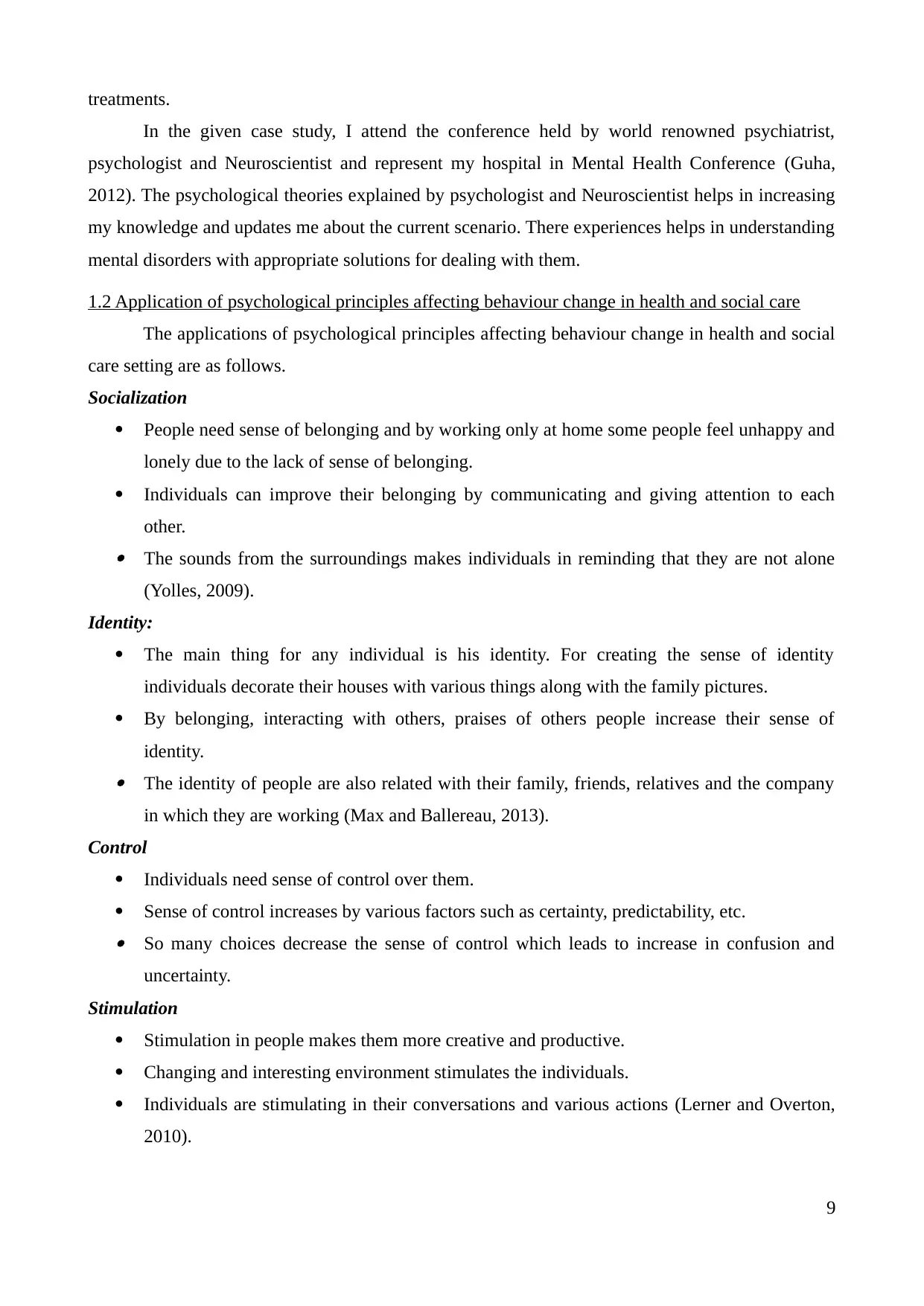
treatments.
In the given case study, I attend the conference held by world renowned psychiatrist,
psychologist and Neuroscientist and represent my hospital in Mental Health Conference (Guha,
2012). The psychological theories explained by psychologist and Neuroscientist helps in increasing
my knowledge and updates me about the current scenario. There experiences helps in understanding
mental disorders with appropriate solutions for dealing with them.
1.2 Application of psychological principles affecting behaviour change in health and social care
The applications of psychological principles affecting behaviour change in health and social
care setting are as follows.
Socialization
People need sense of belonging and by working only at home some people feel unhappy and
lonely due to the lack of sense of belonging.
Individuals can improve their belonging by communicating and giving attention to each
other. The sounds from the surroundings makes individuals in reminding that they are not alone
(Yolles, 2009).
Identity:
The main thing for any individual is his identity. For creating the sense of identity
individuals decorate their houses with various things along with the family pictures.
By belonging, interacting with others, praises of others people increase their sense of
identity. The identity of people are also related with their family, friends, relatives and the company
in which they are working (Max and Ballereau, 2013).
Control
Individuals need sense of control over them.
Sense of control increases by various factors such as certainty, predictability, etc. So many choices decrease the sense of control which leads to increase in confusion and
uncertainty.
Stimulation
Stimulation in people makes them more creative and productive.
Changing and interesting environment stimulates the individuals.
Individuals are stimulating in their conversations and various actions (Lerner and Overton,
2010).
9
In the given case study, I attend the conference held by world renowned psychiatrist,
psychologist and Neuroscientist and represent my hospital in Mental Health Conference (Guha,
2012). The psychological theories explained by psychologist and Neuroscientist helps in increasing
my knowledge and updates me about the current scenario. There experiences helps in understanding
mental disorders with appropriate solutions for dealing with them.
1.2 Application of psychological principles affecting behaviour change in health and social care
The applications of psychological principles affecting behaviour change in health and social
care setting are as follows.
Socialization
People need sense of belonging and by working only at home some people feel unhappy and
lonely due to the lack of sense of belonging.
Individuals can improve their belonging by communicating and giving attention to each
other. The sounds from the surroundings makes individuals in reminding that they are not alone
(Yolles, 2009).
Identity:
The main thing for any individual is his identity. For creating the sense of identity
individuals decorate their houses with various things along with the family pictures.
By belonging, interacting with others, praises of others people increase their sense of
identity. The identity of people are also related with their family, friends, relatives and the company
in which they are working (Max and Ballereau, 2013).
Control
Individuals need sense of control over them.
Sense of control increases by various factors such as certainty, predictability, etc. So many choices decrease the sense of control which leads to increase in confusion and
uncertainty.
Stimulation
Stimulation in people makes them more creative and productive.
Changing and interesting environment stimulates the individuals.
Individuals are stimulating in their conversations and various actions (Lerner and Overton,
2010).
9
⊘ This is a preview!⊘
Do you want full access?
Subscribe today to unlock all pages.

Trusted by 1+ million students worldwide
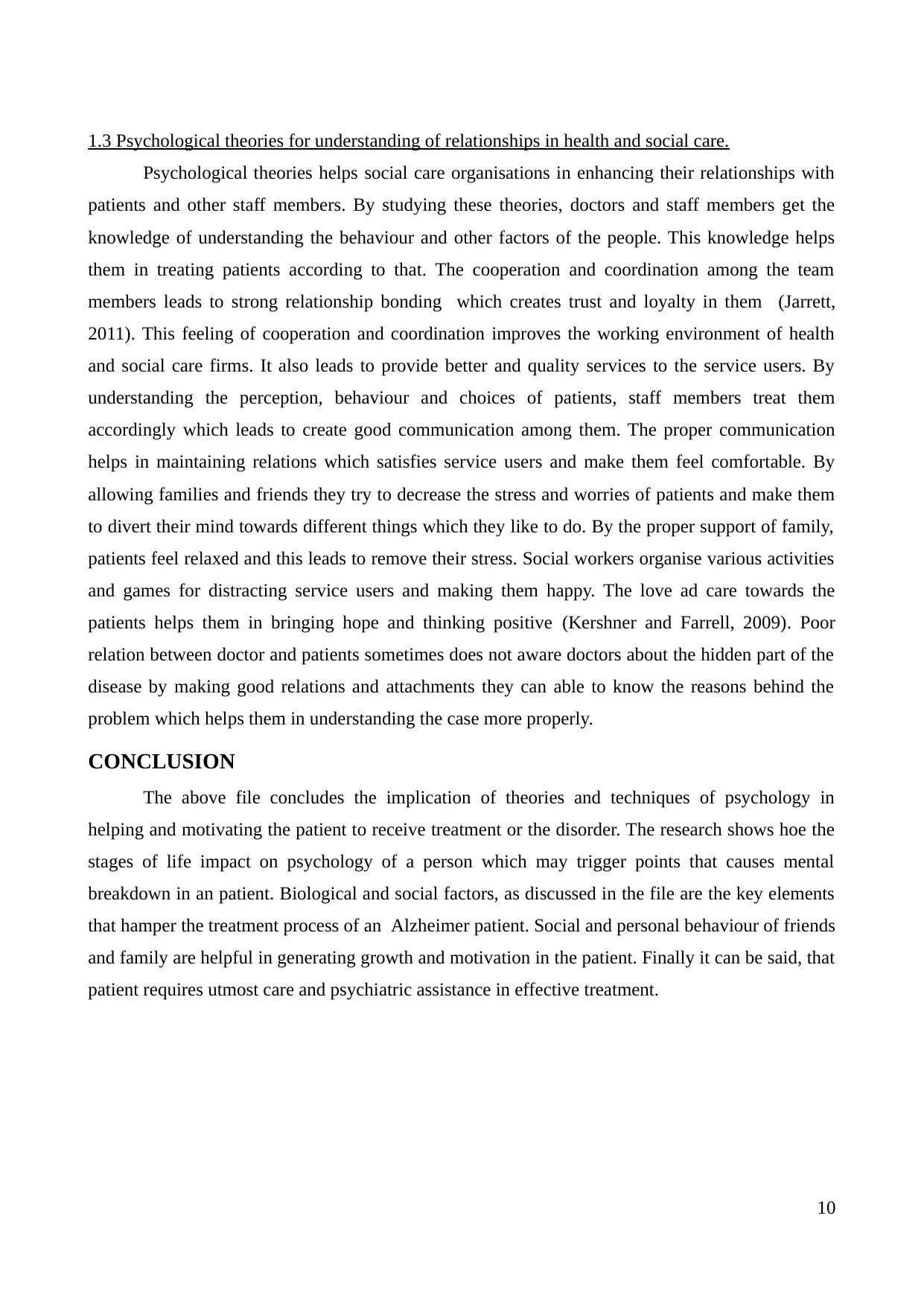
1.3 Psychological theories for understanding of relationships in health and social care.
Psychological theories helps social care organisations in enhancing their relationships with
patients and other staff members. By studying these theories, doctors and staff members get the
knowledge of understanding the behaviour and other factors of the people. This knowledge helps
them in treating patients according to that. The cooperation and coordination among the team
members leads to strong relationship bonding which creates trust and loyalty in them (Jarrett,
2011). This feeling of cooperation and coordination improves the working environment of health
and social care firms. It also leads to provide better and quality services to the service users. By
understanding the perception, behaviour and choices of patients, staff members treat them
accordingly which leads to create good communication among them. The proper communication
helps in maintaining relations which satisfies service users and make them feel comfortable. By
allowing families and friends they try to decrease the stress and worries of patients and make them
to divert their mind towards different things which they like to do. By the proper support of family,
patients feel relaxed and this leads to remove their stress. Social workers organise various activities
and games for distracting service users and making them happy. The love ad care towards the
patients helps them in bringing hope and thinking positive (Kershner and Farrell, 2009). Poor
relation between doctor and patients sometimes does not aware doctors about the hidden part of the
disease by making good relations and attachments they can able to know the reasons behind the
problem which helps them in understanding the case more properly.
CONCLUSION
The above file concludes the implication of theories and techniques of psychology in
helping and motivating the patient to receive treatment or the disorder. The research shows hoe the
stages of life impact on psychology of a person which may trigger points that causes mental
breakdown in an patient. Biological and social factors, as discussed in the file are the key elements
that hamper the treatment process of an Alzheimer patient. Social and personal behaviour of friends
and family are helpful in generating growth and motivation in the patient. Finally it can be said, that
patient requires utmost care and psychiatric assistance in effective treatment.
10
Psychological theories helps social care organisations in enhancing their relationships with
patients and other staff members. By studying these theories, doctors and staff members get the
knowledge of understanding the behaviour and other factors of the people. This knowledge helps
them in treating patients according to that. The cooperation and coordination among the team
members leads to strong relationship bonding which creates trust and loyalty in them (Jarrett,
2011). This feeling of cooperation and coordination improves the working environment of health
and social care firms. It also leads to provide better and quality services to the service users. By
understanding the perception, behaviour and choices of patients, staff members treat them
accordingly which leads to create good communication among them. The proper communication
helps in maintaining relations which satisfies service users and make them feel comfortable. By
allowing families and friends they try to decrease the stress and worries of patients and make them
to divert their mind towards different things which they like to do. By the proper support of family,
patients feel relaxed and this leads to remove their stress. Social workers organise various activities
and games for distracting service users and making them happy. The love ad care towards the
patients helps them in bringing hope and thinking positive (Kershner and Farrell, 2009). Poor
relation between doctor and patients sometimes does not aware doctors about the hidden part of the
disease by making good relations and attachments they can able to know the reasons behind the
problem which helps them in understanding the case more properly.
CONCLUSION
The above file concludes the implication of theories and techniques of psychology in
helping and motivating the patient to receive treatment or the disorder. The research shows hoe the
stages of life impact on psychology of a person which may trigger points that causes mental
breakdown in an patient. Biological and social factors, as discussed in the file are the key elements
that hamper the treatment process of an Alzheimer patient. Social and personal behaviour of friends
and family are helpful in generating growth and motivation in the patient. Finally it can be said, that
patient requires utmost care and psychiatric assistance in effective treatment.
10
Paraphrase This Document
Need a fresh take? Get an instant paraphrase of this document with our AI Paraphraser
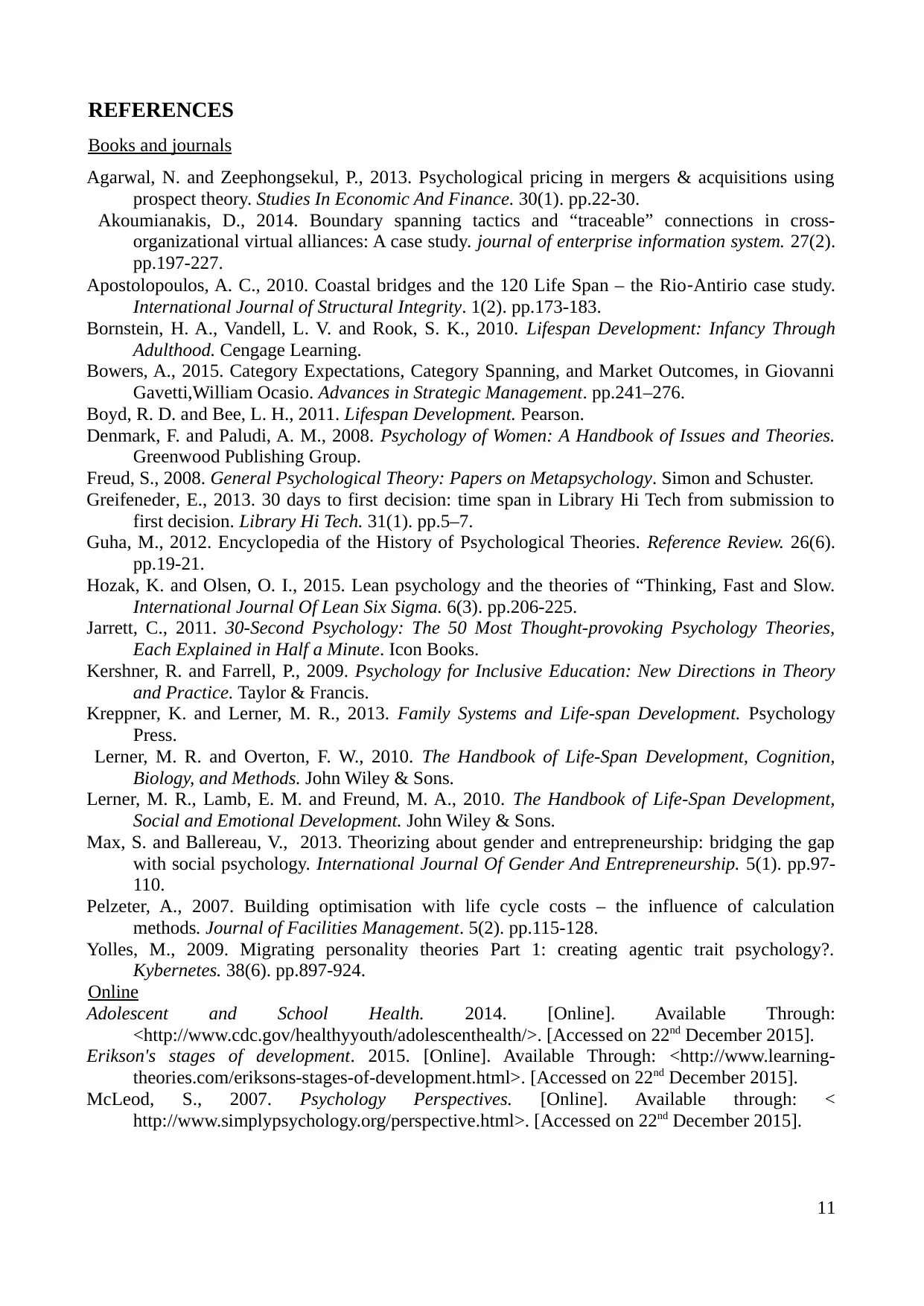
REFERENCES
Books and journals
Agarwal, N. and Zeephongsekul, P., 2013. Psychological pricing in mergers & acquisitions using
prospect theory. Studies In Economic And Finance. 30(1). pp.22-30.
Akoumianakis, D., 2014. Boundary spanning tactics and “traceable” connections in cross-
organizational virtual alliances: A case study. journal of enterprise information system. 27(2).
pp.197-227.
Apostolopoulos, A. C., 2010. Coastal bridges and the 120 Life Span – the Rio‐Antirio case study.
International Journal of Structural Integrity. 1(2). pp.173-183.
Bornstein, H. A., Vandell, L. V. and Rook, S. K., 2010. Lifespan Development: Infancy Through
Adulthood. Cengage Learning.
Bowers, A., 2015. Category Expectations, Category Spanning, and Market Outcomes, in Giovanni
Gavetti,William Ocasio. Advances in Strategic Management. pp.241–276.
Boyd, R. D. and Bee, L. H., 2011. Lifespan Development. Pearson.
Denmark, F. and Paludi, A. M., 2008. Psychology of Women: A Handbook of Issues and Theories.
Greenwood Publishing Group.
Freud, S., 2008. General Psychological Theory: Papers on Metapsychology. Simon and Schuster.
Greifeneder, E., 2013. 30 days to first decision: time span in Library Hi Tech from submission to
first decision. Library Hi Tech. 31(1). pp.5–7.
Guha, M., 2012. Encyclopedia of the History of Psychological Theories. Reference Review. 26(6).
pp.19-21.
Hozak, K. and Olsen, O. I., 2015. Lean psychology and the theories of “Thinking, Fast and Slow.
International Journal Of Lean Six Sigma. 6(3). pp.206-225.
Jarrett, C., 2011. 30-Second Psychology: The 50 Most Thought-provoking Psychology Theories,
Each Explained in Half a Minute. Icon Books.
Kershner, R. and Farrell, P., 2009. Psychology for Inclusive Education: New Directions in Theory
and Practice. Taylor & Francis.
Kreppner, K. and Lerner, M. R., 2013. Family Systems and Life-span Development. Psychology
Press.
Lerner, M. R. and Overton, F. W., 2010. The Handbook of Life-Span Development, Cognition,
Biology, and Methods. John Wiley & Sons.
Lerner, M. R., Lamb, E. M. and Freund, M. A., 2010. The Handbook of Life-Span Development,
Social and Emotional Development. John Wiley & Sons.
Max, S. and Ballereau, V., 2013. Theorizing about gender and entrepreneurship: bridging the gap
with social psychology. International Journal Of Gender And Entrepreneurship. 5(1). pp.97-
110.
Pelzeter, A., 2007. Building optimisation with life cycle costs – the influence of calculation
methods. Journal of Facilities Management. 5(2). pp.115-128.
Yolles, M., 2009. Migrating personality theories Part 1: creating agentic trait psychology?.
Kybernetes. 38(6). pp.897-924.
Online
Adolescent and School Health. 2014. [Online]. Available Through:
<http://www.cdc.gov/healthyyouth/adolescenthealth/>. [Accessed on 22nd December 2015].
Erikson's stages of development. 2015. [Online]. Available Through: <http://www.learning-
theories.com/eriksons-stages-of-development.html>. [Accessed on 22nd December 2015].
McLeod, S., 2007. Psychology Perspectives. [Online]. Available through: <
http://www.simplypsychology.org/perspective.html>. [Accessed on 22nd December 2015].
11
Books and journals
Agarwal, N. and Zeephongsekul, P., 2013. Psychological pricing in mergers & acquisitions using
prospect theory. Studies In Economic And Finance. 30(1). pp.22-30.
Akoumianakis, D., 2014. Boundary spanning tactics and “traceable” connections in cross-
organizational virtual alliances: A case study. journal of enterprise information system. 27(2).
pp.197-227.
Apostolopoulos, A. C., 2010. Coastal bridges and the 120 Life Span – the Rio‐Antirio case study.
International Journal of Structural Integrity. 1(2). pp.173-183.
Bornstein, H. A., Vandell, L. V. and Rook, S. K., 2010. Lifespan Development: Infancy Through
Adulthood. Cengage Learning.
Bowers, A., 2015. Category Expectations, Category Spanning, and Market Outcomes, in Giovanni
Gavetti,William Ocasio. Advances in Strategic Management. pp.241–276.
Boyd, R. D. and Bee, L. H., 2011. Lifespan Development. Pearson.
Denmark, F. and Paludi, A. M., 2008. Psychology of Women: A Handbook of Issues and Theories.
Greenwood Publishing Group.
Freud, S., 2008. General Psychological Theory: Papers on Metapsychology. Simon and Schuster.
Greifeneder, E., 2013. 30 days to first decision: time span in Library Hi Tech from submission to
first decision. Library Hi Tech. 31(1). pp.5–7.
Guha, M., 2012. Encyclopedia of the History of Psychological Theories. Reference Review. 26(6).
pp.19-21.
Hozak, K. and Olsen, O. I., 2015. Lean psychology and the theories of “Thinking, Fast and Slow.
International Journal Of Lean Six Sigma. 6(3). pp.206-225.
Jarrett, C., 2011. 30-Second Psychology: The 50 Most Thought-provoking Psychology Theories,
Each Explained in Half a Minute. Icon Books.
Kershner, R. and Farrell, P., 2009. Psychology for Inclusive Education: New Directions in Theory
and Practice. Taylor & Francis.
Kreppner, K. and Lerner, M. R., 2013. Family Systems and Life-span Development. Psychology
Press.
Lerner, M. R. and Overton, F. W., 2010. The Handbook of Life-Span Development, Cognition,
Biology, and Methods. John Wiley & Sons.
Lerner, M. R., Lamb, E. M. and Freund, M. A., 2010. The Handbook of Life-Span Development,
Social and Emotional Development. John Wiley & Sons.
Max, S. and Ballereau, V., 2013. Theorizing about gender and entrepreneurship: bridging the gap
with social psychology. International Journal Of Gender And Entrepreneurship. 5(1). pp.97-
110.
Pelzeter, A., 2007. Building optimisation with life cycle costs – the influence of calculation
methods. Journal of Facilities Management. 5(2). pp.115-128.
Yolles, M., 2009. Migrating personality theories Part 1: creating agentic trait psychology?.
Kybernetes. 38(6). pp.897-924.
Online
Adolescent and School Health. 2014. [Online]. Available Through:
<http://www.cdc.gov/healthyyouth/adolescenthealth/>. [Accessed on 22nd December 2015].
Erikson's stages of development. 2015. [Online]. Available Through: <http://www.learning-
theories.com/eriksons-stages-of-development.html>. [Accessed on 22nd December 2015].
McLeod, S., 2007. Psychology Perspectives. [Online]. Available through: <
http://www.simplypsychology.org/perspective.html>. [Accessed on 22nd December 2015].
11

12
⊘ This is a preview!⊘
Do you want full access?
Subscribe today to unlock all pages.

Trusted by 1+ million students worldwide
1 out of 12
Related Documents
Your All-in-One AI-Powered Toolkit for Academic Success.
+13062052269
info@desklib.com
Available 24*7 on WhatsApp / Email
![[object Object]](/_next/static/media/star-bottom.7253800d.svg)
Unlock your academic potential
Copyright © 2020–2026 A2Z Services. All Rights Reserved. Developed and managed by ZUCOL.





